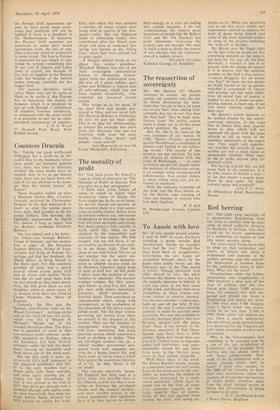The morality of profit
Sir: You have given Mr Powell a page in which to discourse on 'The Morality of Profit' (6 March). Will you give me a few paragraphs? I have now some leisure of mind in which to digest what seventy-six years of happy life have taught me. So far as we know, we do not choose our parents. In this country there is a wide accep- tance of family loyalty. Babies born in families without any inheritance of property or privilege, like mine, may still grow up happy and strong. But there comes a time, usually in early adult life, when we are shocked by the inequalities and injustices of our society. We feel trapped, but we still have, if we are healthy, an illusion of our abili- ty to set things right. Then the cares of our own family life cat up our energy; but the secret res- olution lives on, as the determin- ation to abolish slavery lived on in Abraham Lincoln's mind, even in spite of civil war. At this point move from the position of par- ticipator to spectator. The manual workers endure, for fifty years, ages fifteen to sixty-five, dirt, dan- ger, heat, cold, injury, monotony, pressures, death—sometimes a horrible death. They contribute an indispensable effort, along with management, to the production of the necessities of life plus a surplus called profit. Yet the legal system governing our society gives them no control in the disposal of this surplus. They see the families of management enjoying relatively safe lives, interesting, free from gnawing anxiety about tomorrow's food or clothing or shelter. They see privileged workers like me, a school teacher, guaranteed con- genial work and adequate sec- urity for a happy family life: and there wells up inside them a blind fury against the monstrous injustice of it all. So they blame it all on 'profit'.
Our nresent relatively 'peace- ful England' has been won at a great price: two horrible wars in my lifetime, a civil war that is now going on between the privileged classes and the manual workers, and most terrible misery in the prison population. Our legislators have it in their power to devote their energy to a start on ending this radical injustice. I do not underestimate the sincere good intentions of people like Mr Robert Carr and Mr Vic Feather; but good intentions, skimming the surface, are not enough. We need to build a dam to divert the waters of our energies into the righteous- ness of a mighty stream.










































 Previous page
Previous page